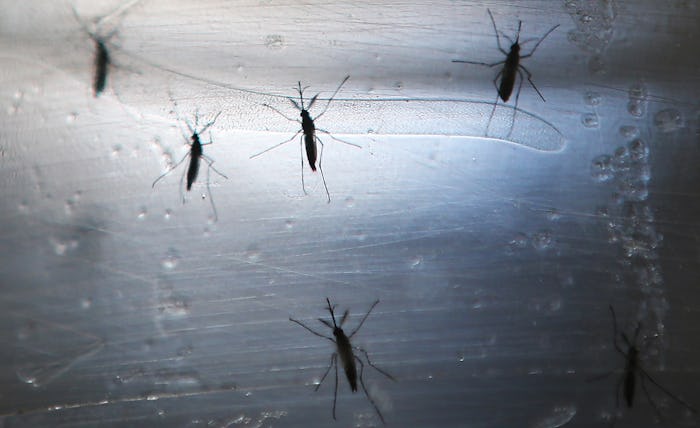Life

When Will Zika Hit Florida? There Are Already Travel-Related Cases
As much as the summer months are often a time most people welcome (drinks on a patio, anyone?), this year, the threat of the Zika virus is giving everyone a reason to stay indoors a little more than usual. For months now, officials have been warning of the virus's arrival in the United States, bringing with it the risk of severe pregnancy complications and birth defects, as well as the potential for possible paralysis and other conditions affecting the nervous system. Given its location, Florida is expected to be one of the states hardest hit by the arrival of Zika outside of U.S. territories like Puerto Rico, so whether you live there, or plan on traveling there this summer, you're probably wondering, when will Zika hit Florida? According to the Centers for Disease Control, there's good news, and bad news. The bad news is that, as expected, Florida already has a high number of confirmed travel-related cases of Zika (141 cases, the second-largest after New York). The good news? So far, there have been no confirmed cases of local transmission. Yet, at least.
According to the CDC, there are currently 755 confirmed cases of travel-related Zika in the United States, though the bulk of those cases have occurred in New York, Florida, California, and Texas. Out of those cases, 11 of them were sexually transmitted, and three of them resulted in a secondary case of Guillain-Barré syndrome, which is a neurological disorder that can cause temporary or permanent paralysis, according to the Mayo Clinic.
Unfortunately for residents, Florida is home to an "almost year-round" population of Aedes aegypti mosquitoes, which is the primary vector for the Zika virus. And coupled with a high number of travelers coming from countries already hit hard by the virus, the state is a perfect target for an outbreak. According to the Miami-Herald, which updates a daily Zika virus tracker on its website, the first three cases of Zika were confirmed in Florida back in January, and now, 20 counties in Florida have confirmed travel-related cases, with the majority occurring in Miami-Dade and Broward counties. According to Jacksonville-based news station Action News Jax, as of Friday, 39 of the confirmed Zika cases in Florida involved pregnant women.
The question now seems to be, what could happen next? Despite the cases related to travel, none of the mainland U.S. states have seen any cases from local mosquitoes, but could that change at any moment? The situation isn't looking so great in Puerto Rico right now, where, according to the CDC, locally-transmitted cases of Zika (a whopping 1,386) make up 97 percent of the cases.
Still, officials haven't said anything definitively about Florida. That means that, for now, local mosquito control is being ramped up.
According to PBS News Hour, local governments in Florida are working to keep up with the spread of the virus, laying mosquito traps, conducting tests, tracking mosquitos, and spraying insecticide to prepare themselves as best they can before the first locally-transmitted case occurs. But according to Michael Farzan, vice chairman of the department of immunology and microbial science at Scripps Research Institute in Jupiter, local mosquito control varies county to county, depending on budget and population size. Miami-Dade, for example, has a relatively low budget, given its size and its positioning as a travel hub.
One person not so concerned though is Osceola County mosquito control director, Terry Torrens. According to PBS News Hour, Torrens said that Florida mosquito officials are well-versed in prevention and control techniques:
The Florida mosquito control districts are fully prepared to handle Zika as this is not our first rodeo with these...mosquitos. We have been hunting and killing these species effectively for years. Florida is slap full of decorated and published mosquito professionals housed in districts across the state, we are ready.
As for individuals and families looking for ways to reduce their own risk of contracting Zika? Palm Beach Daily News recommends being vigilant about standing water, where mosquitos can breed:
Ornamental ponds can be stocked with mosquito-eating fish. Avoid spraying with garden insect sprays, and keep the water level up. With swimming pools, operate the filter and skimmer continuously. If a pool cover is used, keep it tightly sealed. Rain gutters should be kept clean and cleared of leaves. Fill tree holes with sand where possible. All containers should be stored upside down. Discard unwanted containers that might collect rain water or water from sprinklers. This includes barrels, buckets, wading pools and watering pans under potted plants.
While there is currently no approved vaccine for the Zika virus, keeping exposed skin covered, staying indoors and using bug spray with DEET will also help prevent mosquito bites that could transmit the virus — although, for now at least, travel and unprotected sex still appear to be the biggest risks associated with contracting Zika.